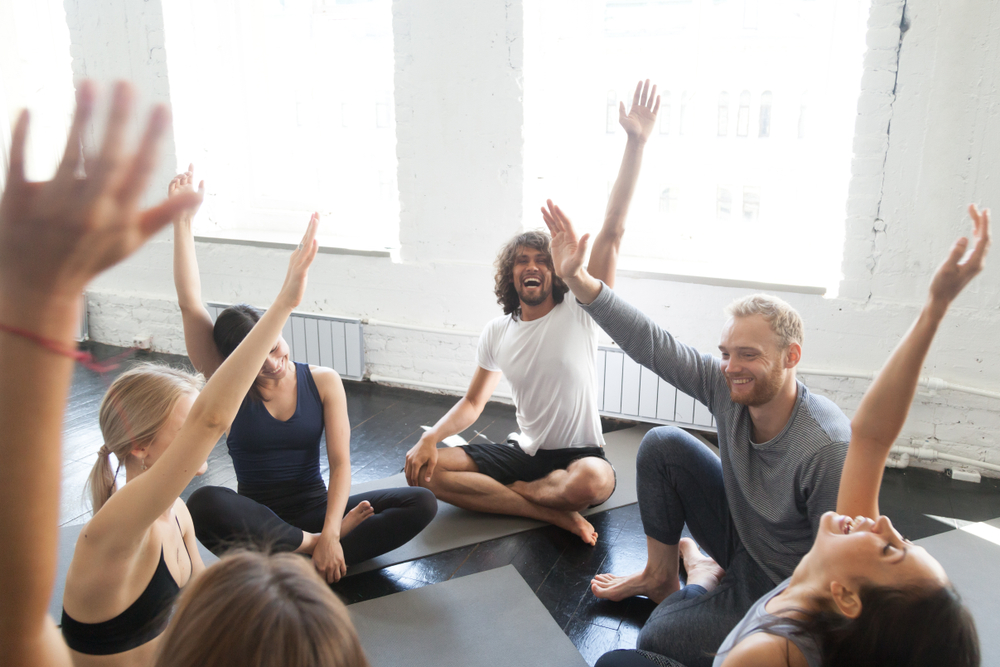Laughing reduces stress, lowers blood pressure, can help us look younger and even live longer according to the experts, discovers Christine Fieldhouse
Remember the last time you had a really good laugh? A time when you thought your ribs might crack, tears rolled down your face, you gasped to draw breath, and, no matter how hard you tried, you just couldn’t stop? And if you managed to keep a straight face for a nano-second, you creased up again straight away?
For many of us, embroiled in the day-to-day seriousness of modern life, with jobs to do, homes to run and people to talk to, fits of laughter like that are few and far between. But when we have an attack of the giggles, once we’ve regained our composure, life seems easier, worries evaporate and we’re kinder and more compassionate.

But laughing is seriously good for us. So much so that there’s even a day to focus on it every year – World Laughter Day. Created in 1998 by Indian physician Dr Madan Kataria, the founder of laughter yoga, it’s celebrated in more than 70 countries across the world every year on the first Sunday of May.
Dr. Kataria was inspired to start the laughter yoga movement after the discovery that a person’s facial expressions can have an effect on their emotions. Now, on the day itself, people gather around the word in public places with the sole purpose of laughing. Its main aim is to build global friendship through laughter.
No Laughing Matter
So why is laughter in such short supply that it needs its own day? Shouldn’t it be as natural as waking up in a morning and breathing?
According to experts, we’ve lost the knack. Somewhere between being a child and growing up, with a job to do, and responsibilities to face, we lost sight of our playful side. But the good news is, it’s still inside us somewhere. We just need to coax it out.

‘In today’s world, laughter is becoming rarer,’ says business and life strategist Sami Toussi. ‘Many of us have lost the child-like ability to see beauty in little things. When we were young, we had beautiful dreams and great goals. We had few responsibilities, apart from school, friends and homework.
‘And then, real life kicked in. We found a job, but maybe we weren’t all that happy, and maybe we didn’t earn enough. Realising life isn’t as it “should be”, we’re left with unfulfilled expectations and broken dreams.
‘When you’re in that frame of mind, or when you’re faced with a crisis, it’s harder to laugh and express joy. The pandemic is a powerful example of a time when we felt stressed, anxious and fearful about the future.
‘People also feel guilt about being overtly happy. Most people tend to connect over negative experiences, as studies show that trauma bonds us. This is why you hear more conversations where people complain, than talk about how happy they are.’
So why is laughter good for us? After all, isn’t it just another way of showing a positive emotion?
‘Laughter is one among the best medicines for stress relief,’ Sami, who is based in Los Angeles and works with clients all over the world, continues. ‘It is also often said that those who laugh a lot live longer. Laughing produces happy chemicals in the body called endorphins, which work in the brain to give us an overall feeling of contentment.
‘Laughter helps creates a more youthful appearance. It strengthens your immune system, boosts mood, diminishes pain, and protects from the damaging effects of stress’
‘When you laugh, all thought processes stop and no other thoughts enter your mind. This is a way of relieving stress, thus lowering blood pressure. According to a recent study done by cardiologists at the University of Maryland in the US, this can in turn indirectly reduce our risk of a heart attack and other serious health-related problems.
‘Laughter also creates a more youthful appearance. It strengthens your immune system, boosts mood, diminishes pain, and protects from the damaging effects of stress. Nothing works faster or more dependably to bring your mind and body back into balance than a good laugh. Humour lightens your burdens, inspires hope, connects you to others, and keeps you grounded, focused and alert. It also helps you release anger and forgive sooner.’
Happy Place
Motivational coach and speaker Phil Olley points out that laughter puts the brain in a positive state, encouraging the release of dopamine, the neurotransmitter linked with enjoyment, and the hormone oxytocin, which we produce when we hug or cuddle someone. And once we have those two on our side, the benefits keep on coming.

‘The whole body relaxes. Physical tension is released,’ says UK-based Phil, author of Reflections from the White Tunnel (FCM Publishing). ‘You can’t keep the muscles in your neck, shoulders and arms tense if you’re having a good belly laugh. It then sends signals to the mind from the physical self to say that you’re not stressed.’
If laughter is that beneficial, shouldn’t we be doing it as part of our daily self-care regime, just as we eat five portions of fruit and veg and do 10,000 steps every day? But, when we’re fearful or anxious about our jobs, our children, relationships, the chance of illness, conflict in the world, how can we find things to laugh about?
Here are Sami and Phil’s top tips to help you see the funny side and get laughing every day:
1. Set a laughter goal
Make a resolution to laugh heartily as often as you can, says Sami.
‘This goal is just as important as planning to get more exercise, eat more healthily and drink more water,’ she says. ‘Tell yourself you will laugh hard more than five times today.
‘If you believe it and intend it, it will simply just happen. It’s very similar to manifestation.’
2. Act it out
Pretend to laugh and you’ll trick your brain, recommends Phil.
‘If you fake a laugh, it sends a signal to the brain that you’re laughing,’ he explains, ‘and the brain will create the state of mind that’s consistent with laughter. You’ll free up your body and you’ll carry on laughing until it becomes natural.’
3. Start a humour journal
Sami suggests that every day we write down the things we found amusing.

‘When you’re sad and need a smile, look back on your humour journal,’ she advises. ‘Psychologists find that jotting down our feelings helps release tension, so as well as writing about sad things in a notebook, why not keep a note of happy things too?’
4. Use your laughter cues
Surround yourself with visual reminders that guarantee a giggle, suggests Bev Cripps, a UK-based clinical hypnotherapist, positive psychology coach and resilience trainer.

‘Have a collection of mugs with humorous things on them or collect postcards or fridge magnets with witty sayings on,’ recommends Bev. ‘Display photos of things that make you laugh, or pictures of you when you were laughing uncontrollably with a group of friends – anything to remind you of funny, light-hearted times.’
5. Be around funny people
Surround yourself with people who like a good laugh, says Phil.

‘Those who are full of doom and gloom drag us down and dampen our mood, so why spend time with them, when you could be with people who see the lighter side of life? Go to a comedy club or watch a comedy box set that has you in hysterics. Canned laughter really works – it gets you laughing along too.’
6. Try laughter meditation
To do this, sit quietly and focus on your breath, and when you are settled and quiet, summon up something funny that has happened or a funny image, post or video that made you laugh.
‘You’ll start by smiling and then you can dial up the feeling,’ says Bev Cripps. ‘Then layer something else that’s funny on top of it. You’ll soon be laughing. You can do this anywhere, even when stuck in traffic. Ideally, start the day with a session.’
7. Read a funny book
‘A genuinely funny book is one of life’s great pleasures and it will definitely result in a few good laughs,’ says Sami. ‘When you read a book, you use your imagination to submerge yourself into the story. The story takes you away from real life.’
8. Go down Memory Lane
Tap into your playful side by reliving what you loved doing as a child, suggests Phil.
‘When you go past a playground or a park, you hear the sound of children’s laughter,’ he says. ‘They scream and shout and it’s all very positive. Think back to your childhood pastimes and get more of them in your life – play some rounders or tennis, offer to walk a dog if you don’t have one or go and play on the beach.’
9. Practise laughter yoga
Dr Kataria’s laughter yoga is now practised in 110 countries and combines laughter exercises with yoga breathing techniques (Pranayama) to bring more oxygen to our body and brain. In turn, this can make us feel more energetic and just ten minutes of laughter yoga can reduce stress, make your immune system stronger and keep your mind positive during challenging times.
‘Laughter is contagious and if we’re in a group of people where someone is laughing, we’ll probably end up laughing too, once we’ve got over our self-consciousness,’ says Bev.
‘You can do laughter yoga online or join a class where it’s usually guided. When you laugh with someone else, you boost communication and you bond with them.’
- For more information about Phil Olley’s work, go to philolley.com
- Bev Cripps offers Reset and Resilience for 2022 sessions with NLP, hypnotherapy and coaching; go to mybcconnection.com
- Read more about Sami Toussi on samitoussi.com









